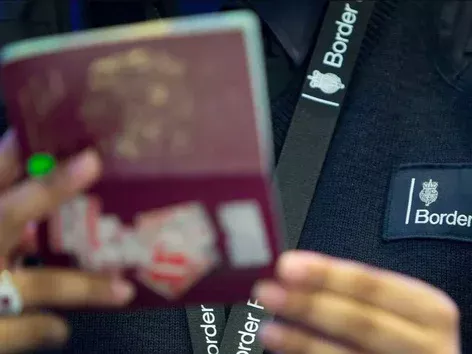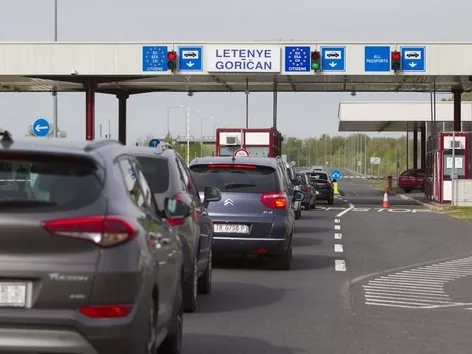EES will become operational in October 2025: should we expect queues at EU borders?
Table of contents
- What are EES systems?
- What are ETIAS systems?
- Do foreigners who have a residence permit in the EU need to register in the EES and ETIAS system?
- Where will the EES check be conducted?
- Are there possible delays in passing controls in European countries in connection with the introduction of EES?
- How to avoid fraud when registering in the ETIAS system?

After many attempts, the new European Union entry and exit control system, the EES, is finally set to go live in October 2025. It is expected that starting this fall, entry into the European Union for citizens of non-EU countries will become more difficult. Find out when the EES will be introduced, whether foreigners with an EU residence permit need to register with the EES and ETIAS systems, and other important details
The official EU website dedicated to the EES states that the system will start operating on October 12, 2025. It is part of the European Travel Information and Authorization System (ETIAS), which, according to experts, will be implemented next year. As part of the innovation, foreigners who will arrive in the EU on the basis of a visa-free regime will have to submit an application for entry and pay a fee before traveling.
What changes are expected in the system of entry and exit to European countries in 2025-2026? Let's talk further.
Choose a reliable health insurance policy from Visit World to travel abroad safely.
What are EES systems?
With the help of the EES system, certain information about foreigners entering the EU will be registered:
- passport data;
- biometric information (fingerprints and photo of the face).
Due to the introduction of EES, stamps in passports will be abolished. Instead, the system will automatically register when someone enters or leaves an EU country. That is why it will be much easier to identify persons who have violated the period of stay in the Schengen zone.
Importantly! According to EU law, citizens of non-EU countries who are entitled to visa-free travel can stay in the EU for only 90 days. For a longer stay, it is necessary to issue a visa.
The requirements of the EES system do not apply to foreigners traveling between Schengen countries.
What are ETIAS systems?
The ETIAS system will require foreigners who are citizens of non-EU countries to complete a registration procedure, pay a visa fee, and obtain the appropriate permit before traveling to the region.This requirement applies to persons aged 18 to 70 years.
According to the decision adopted in 2018, the fee is set at €7, and in view of rising inflation and additional operational costs, it is proposed to increase it to €20 per application, valid for three years. The adjustment of the fee is to be considered by the Council of the EU and the European Parliament within two months, and the decision will enter into force as soon as ETIAS is put into operation, namely in the last quarter of 2026.
On the basis of the document, it is allowed to stay in the territory of the EU and the Schengen zone for 90 days. Once the visa is approved, the traveler does not need to reapply for three years.
Although the exact launch date is unknown, the EU has previously stressed that ETIAS will be implemented five to six months after the EES.
Do foreigners who have a residence permit in the EU need to register in the EES and ETIAS system?
Foreign nationals who are citizens of non-EU countries, but have a residence permit in one of the countries of the region, are exempt from registration in the EES and ETIAS systems, as well as from the 90-day limit on staying in the region.
Control of this category of citizens will take place on the basis of a biometric identity card, for example carte de séjour in France or carta di soggiorno in Italy. However, the bloc's leadership has not released any information on how automatic border barriers will identify a traveler as an EU resident if they are using a non-EU passport.
Where will the EES check be conducted?
EU countries are preparing to install automatic barriers to check EES:
- France plans to install self-service kiosks at airports where travelers can register their biometric and personal data before going to a border guard for inspection. Tablet data entry devices will be available for visitors arriving by car at France's land and sea borders.
- Germany and Austria have confirmed that the necessary system will also be installed in airports.
- Italy has said it will increase the number of automatic gates at all its major airports, as well as add around 600 self-service kiosks.
- Norway plans to test "automated cameras", which will be managed by the border service.
Are there possible delays in passing controls in European countries in connection with the introduction of EES?
Representatives of tourism associations are already expressing their concerns about the introduction of the EES system, because citizens will have to spend much more time when they first arrive in the EU to provide biometric data compared to the current passport check. Some experts say travelers can wait up to 14 hours at border crossings.
The governments of European countries are also talking about possible delays. In particular, Austria and Germany were particularly concerned that waiting times at the border could increase. Even travelers residing in the EU can experience delays.
Obviously, this policy can have very serious consequences not only for tourists and tour operators, but also for local businesses.
How to avoid fraud when registering in the ETIAS system?
The European Union authorities have already issued a warning to citizens of non-EU countries about possible fraudulent websites offering ETIAS visas. As of now, 60 unofficial sites have been found in the network. According to the EU border control agency, fraudsters create copies of websites or offer intermediary services. In general, users are illegally charged additional commissions on their resources.
Importantly! There is only one official site, the ETIAS official site.
Planning a trip or moving abroad? A travel insurance policy is an important component of a successful trip, as it guarantees high-quality medical care anywhere in the world and can protect you from unnecessary expenses during your trip.
Buy insurance from trusted agents on the Visit World portal!
As a reminder! The EU has backed a law that will ban airlines from charging extra for hand luggage. We've already told you what will change for passengers when the new rule comes into effect, who it affects, and how budget carriers are reacting.
Products from Visit World for a comfortable trip:
Travel guide for 200 countries;
Legal advice from a local specialist on visa and migration issues;
Travel insurance around the world (please select the country of interest and citizenship to receive services);
Medical insurance all over the world.
We monitor the accuracy and relevance of our information, so if you notice any errors or inconsistencies, please contact our hotline.
Frequantly
asked questions
When will the EES system start operating and who will it affect?
Is it mandatory to apply for an ETIAS to travel to the EU?
How to avoid being scammed by ETIAS registration?
Recommended articles
2 min
Travels
The most dangerous countries in Europe in 2025
Europe is undoubtedly one of the most beautiful and peaceful continents in the world, but it also faces challenges of crime and violence. Find out which countries are the most dangerous in 2025
24 May. 2025
More details2 min
Expats
European countries continue border controls at their internal borders. Find out which countries have new rules in place, how checks are carried out and what are the deadlines for additional controls
01 Dec. 2025
More details2 min
Travels
The best European destinations for solo travel: where to go on vacation alone?
Planning a solo trip across Europe in 2025? Discover the 7 destinations Lonely Planet has named the best for solo travelers – from Sicily to the Faroe Islands. Safe, atmospheric and inspiring routes + tips for solo travel
22 Jun. 2025
More details2 min
Travels
Europe Tightens Tourist Rules in 2025: Bans, Fines and Unexpected Restrictions You Should Know
Planning a trip to Europe in 2025? Find out what new restrictions, bans and fines await tourists in the most popular countries – Spain, Italy, France, Greece, the Netherlands and more. Travel responsibly – and enjoy Europe without problems
22 Jun. 2025
More detailsAll materials and articles are owned by VisitWorld.Today and are protected by international intellectual property regulations. When using materials, approval from VisitWorld.Today is required.
